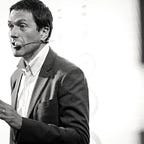DIGITAL: THE IMPORTANCE OF UNLEARNING
The amount of daily exposure to words and images, in every possible format like billboards, emails, videos or books shows the need of mental skills needed in our society. Skills incrementally intensifying and, therefore, speeding up the learning process, which has become a key element to create a digital age of agile learners.
Agile learners are light and fast, like runners who need to be slim and fit. And runners cannot carry old clothes and souvenirs in their small backpacks, but only what is strictly necessary to keep going while staying light. So as runners need to unload the surplus, agile learners need to undertake an intentional unlearning cycle of their analog skills to learn new digital skills. And this process occurs at an individual, team and organisational level.
Space in our mind is limited for new content, so it is for new digital tools replacing the old analog (some “old school” tools can stay, I keep taking notes with a fountain pen while reading papers on machine learning). A trade off example of replacing old for new, is the study on London cab drivers where data show that the memorisation of hundreds of street names to get the compulsory taxi license may enlarge the hippocampus’s posterior (rear), but at the expense of its anterior (front). The trade off is clear-cut for memory, fortunately a complex and enduring skill, whose complexity makes difficult to learn, but also to forget, for example how to go on a bicycle, despite not cycling anymore for years.
So what to do when you need yourself, your analog organisation and team to become digital? A new digital mind-set will only occur at the expenses of an old analog one, and despite data show that an increased load of information enables unlearning, timing will not be in your favour. Especially in knowledge-intensive environments, in which controlling knowledge is vital, companies should be able to manage processes of unlearning and only by effectively dealing with antecedents of knowledge loss, companies will be able to improve their knowledge stock.
Unlearning, forgetting or knowledge loss requires a shift from the individual’s incorrect or inappropriate assumptions (beliefs, knowledge and knowledge structures) to relearning among groups. In other words it is about moving from individual to group and organizational levels (feed forward).
The process occurs on three layers: at the individual level, it is important to identify incorrect or inappropriate expectations or beliefs that will affect the ability of an individual to differentiate between facts and fiction, displaying willingness to put aside obsolete knowledge, be open-minded when it comes to new ideas, and have the ability to distinguish relevant from irrelevant knowledge. For example spotting selective perceptions, errors and misunderstandings.
At the group level, the second layer, team members are encouraged to look for realistic solutions within the context and the safety, not the comfort, that a small working group provides, for example by implementing a mistake-forgiving culture, that does not apply only to digital, but to a new wave of consumers, like millennials who are not buyers anymore, but users. For millennials it is not anymore about the price, but about the experience, making unlearning a must for a price-based policy, to learn instead how to implement a user friendly experience.
At the last layer, the organizational level, positive reinforcement should be provided to offer the opportunity for getting familiar with new realistic solutions (e.g. new behaviors or routines) by one working group and the sharing of these new solutions with other working groups. There is an important condition: the presence of temporal and spatial freedom allowing employees to meet and interact and the provision of appropriate rewards for “thinking outside the box”.
Also the learning-unlearning process has three components for any layer: the well known cognitive one, the emotional and the unconscious component. An example is learning a new language, a process that requires a strong cognitive effort in memorising the words and also an emotional stability to overtake frustration. The prolonged effort will allow you to retrieve and create entire conversations from your memory. The same prolonged effort made of cognition, affection and conation will allow the unlearning of old useless job practices. The change will measure the success of this process and these questions will allow the quantification:
What do I know now?
What is the value of what I learned?
What problems can I solve with this new learnt tool?
To quantify also the unlearning, similarly you can ask yourself, What is the knowledge loss? What was the value of keeping using the “old clothes”? What problems could I really solve with what I consciously forgot?
Everyone has now he challenge of getting self, team or organisation at the pace of technology and so to create a learning space in the long term. Only few are paying attention to the unlearning process, which works like scratching “old school” habits to prepare the mind layer to be painted with the latest digital tools.
